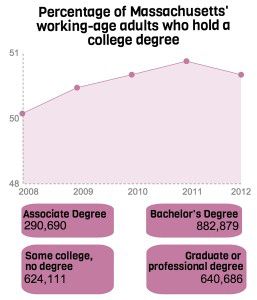
As students at Boston University strive to earn four-year degrees, a new report published Tuesday reveals a slow increase in the national rate of college degree completion.
The report, which was conducted by the Lumina Foundation, sought to gauge the rate of degree completion among American college and university students. Nationally, college attainment has increased 0.7 percent from 38.7 in 2012 to 39.4 percent in 2013, according to the data.
“This is the largest year-over-year increase in degree attainment since Lumina began these reports,” the study stated. “Last year, the rate was 0.4 of a percentage point higher than the prior year; the two years before that, it increased by only 0.2 of a percentage point per year. Clearly, the rate at which degree attainment is increasing is accelerating.”
Although the rate of increase is slow, it demonstrates progress in the Lumina Foundation’s “2025 Plan” to raise college attainment to 60 percent ove the next 11 years.
“It’s certainly too soon to declare that we are on track to meet the goal, but the data do show that the nation is quickening its pace in the effort to increase college attainment, and that is encouraging news,” the study stated.
The national increase in degree attainment shows a sharp contrast to the BU graduation rate, which is 84 percent, said BU spokesman Colin Riley.
“There is a national discussion on college affordability, and students and their parents are more focused on their higher education investment than ever before, so it is not surprising to see increasing numbers of students completing their degrees,” Riley said. “Even though it is slow, it is on the right vector. That is good news and consistent with our experience at Boston University, where the graduation rate has increased to nearly 84 percent.”
Riley said BU works to promote degree completion by breaking down the barriers that have kept students from attaining a four-year education with ease.
“BU has removed the limits that in the past have prevented students from transferring or taking courses between schools,” he said. “Now people can take classes across disciplines. There’s been real effort to facilitate that. We try to remove all barriers to completion.”
Students at BU noted that the university makes a strong effort to help students complete what is often a strenuous path to a college degree.
Kristen Cooke, a first-year graduate student in the Graduate School of Arts and Sciences, said BU professors and administration make graduation requirements clear and understandable.
“The guidelines have been clear,” Cooke said. “They definitely help us by sending us reminders of what we’re supposed to be doing, and the professors are really helpful and understanding.”
Gabriella Henkels, a College of Engineering freshman, said her school’s strict schedule elucidates what is required of her.
“The college of engineering has a very structured schedule so it clearly lays out what you need to do in order to graduate,” Henkels said.
Grace Li, a College of Communication and College of Arts and Sciences sophomore, said BU aids its students by providing a helpful and accessible faculty and administration.
“BU is one of the hardest schools to have ‘A’ grades,” she said. “I don’t think it’s hard to graduate, though, because BU has really great and helpful professors and teaching assistants that want to help you with your grades.”
Katie Hunter, a Sargent College of Health and Rehabilitation Sciences freshman, said the benefits of having a degree from BU makes the struggle of attaining it worth it.
“I’ll graduate with a degree from BU, which is reputable,” Hunter said. “It’s an established university worldwide that people recognize, and to come out with internships and a degree from this institution is impressive.”
This is an account occasionally used by the Daily Free Press editors to post archived posts from previous iterations of the site or otherwise for special circumstance publications. See authorship info on the byline at the top of the page.



